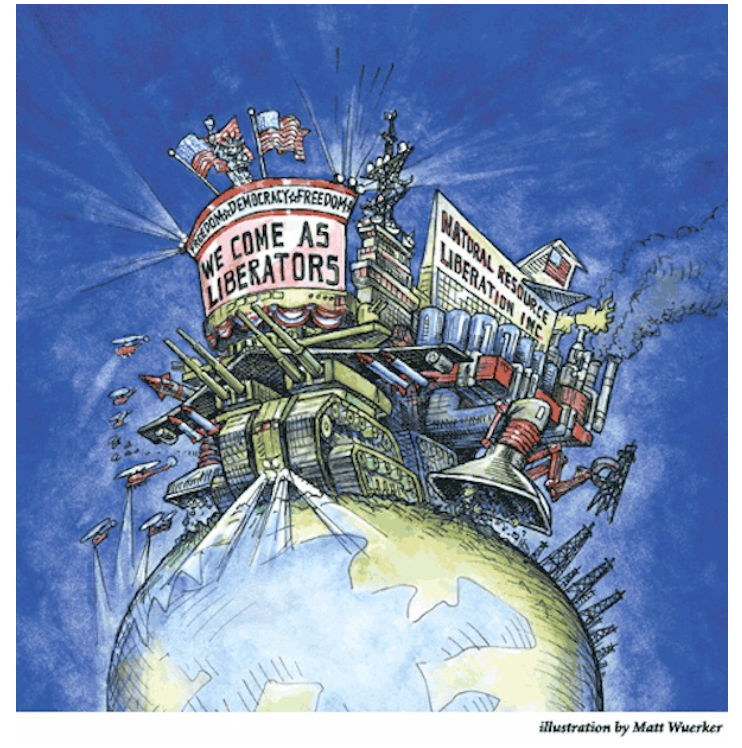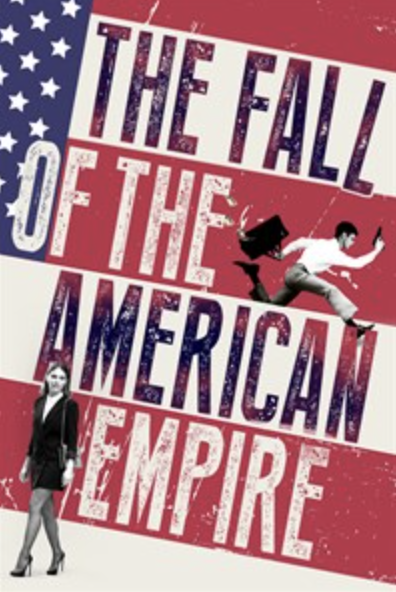Definition
Throughout history, the word empire has changed meaning. In a political context, an empire can be measured as a distinct political unit of analysis. An empire consists of diverse territories – with fixed or absent physical boundaries – that may internally have differing political structures but are connected to a larger, central governing apparatus. [1] However, depending on the perspective in which one analyzes the term empire and the factors considered in what influences an empire, this stricter definition can change. In this essay, we will expand on this territorial-based definition of empire and address how these definitions and depictions differ through the lens of US politics, global alliances, social cultural mechanisms, activism, and historical events. We also elaborate on the ways in which different communities and societies respond to and interact with the term empire. These perspectives co-exist and can affect one another and only constitute a few of many definitions of empire across other academic and artistic disciplines.
Empire vs. Imperialism
In our discussion of the word empire, we recognize that our analysis and definition are closely related to the word imperialism. Empire and imperialism are both deeply interconnected and related. Although these terms may share many similarities such as common goals of territorial, economic, or political expansion, the difference between these two terms is that empires are simply polities that exercise imperialism. In other words, the presence of empires is the embodiment of direct forms of imperialism where empires often use imperialism as a tactic to expand their territory and power over other governing bodies/countries.
Discussion
The American Definition of Empire
Throughout history, the US has viewed other nations as empires: the Ottoman Empire, the British Empire, the Japanese Empire, etc. While America focuses on the territorial expansions of these other nations, it has never considered itself an empire. America’s foundation of freedom and democracy and the desire to distance itself from imperialism makes it difficult, complex, and uncomfortable for the U.S. to label itself as an empire. [2] However, if one analyzes America’s history and current state of territorial military occupation, it’s hard to deny that America has become a hidden modern-day empire. Instead of explicitly occupying and ruling a country’s territory and existence, the U.S. has turned to “other, harder-to-see forms of global power” through the establishment of military bases. [3] For example, even after the U.S. granted the Philippines independence, the U.S. pressured the Philippines to grant the establishment of 23 American military bases rent-free for 99 years. [4] America’s establishment of foreign military bases is a form of territorial expansion that allows them to have both indirect and direct global control. It is indirect because the U.S. does not directly control the host country’s governing body, but the U.S. influences the surrounding area and host government via physical occupation and political agreements, and the expansion is direct because the U.S. gains another physical space in which they have jurisdiction and are physically closer to countries abroad. Even when the host country agrees to rent their physical land to the U.S. as a military base, the act of occupying international land with the intention of securing U.S. safety and security, is a clear example of the expansion of the American empire and their intentions of maintaining power. Across the U.S, the U.S. territories, and over seventy other nations, America owns around 800 military bases, which equals 90% – 95% of the world’s total number of foreign bases [5] [4]. This number of leased foreign land does not include other secret CIA bases that protect the U.S. against global “terrorism.” [5] Contrary to popular belief that physical American expansions stopped within the US, American “economic, military, and cultural” control reaches far beyond the mainland. [3] Again, these bases heavily influence and control the surrounding culture, physical space, and political atmosphere of the occupied territories, and there are often unbalanced power dynamics involved. Unlike other countries, no foreign bases are established within the U.S. or in American territories. [5] The vocabulary and ideas America chooses to describe its physical and legal occupation internationally heavily affect how American citizens and the world view America’s global empire. America has redefined how empires can present themselves by becoming an informal empire via military occupations rather than a formal empire in charge of separate colonies.

As the US expands its global power via military occupation and alliances, the physical presence of American bases actively disrupts international communities and the environment. Foreign bases have a long history of gender-based violence, environmental disruption and pollution, military personnel crimes, military accidents, property damage, and outside business establishments catered specifically towards military personnel. [4] These issues have led to many anti-base movements throughout the world. Many Americans do not realize or reflect upon the existence and effects of foreign bases and consider these bases as normal, acceptable, and unquestionable. [7] However, native civilians living in the surrounding area are subjected to all the effects that come with foreign occupation of their land that they did not agree to. These issues are especially prevalent for people living in Okinawa, a Japanese prefecture. Although Okinawa only makes up 0.6% of the land area of Japan, 70.6% of Okinawa land is used by U.S. military facilities. [6] The physical occupation of international land and the corresponding negative impacts it has on the surrounding community is a direct effect of the American empire even if the U.S. is not specifically controlling the people living there and the law. In the case of Okinawa, U.S. military occupation and effect are amplified. US military territories abroad is a discreet form of empire expansion that has real and lasting impacts on international communities and foreign relations.
“Contrary to some popular portrayals, most [anti-base] movements challenging US bases overseas are not anti-American in the sense of being opposed to US citizens and all things from the United States…Many are asking for greater environmental protections, the reduction of aircraft noise, the return of land, or the accountability for crimes committed by troops.” [4]
David Vine, anthropology professor at American university
Indirect Empire Expansion
Moving past the aforementioned territorial definitions of empire, it is important to acknowledge that empire is not always expanded through direct military intervention or occupation. Many empires, including the U.S. in the modern day, are expanded through strategic alliances that serve their economic interests. An example of this historically can be seen in the U.S.’s backing of Augusto Pinochet’s dictatorship and the military coup in Chile. The US military did not directly invade Chile to install what has come to be known as a puppet dictatorship (they may have been involved in the planning of the coup though they still deny it), yet the US is still deeply imbricated in the downfall of Allende’s social democratic government. In a 1973 transcript of a phone call between President Nixon and his secretary of state, Henry Kissinger, Kissinger remarks: “We didn’t do it. I mean we helped them…created the conditions as great as possible” regarding the coup.[22] Even before Allende took office the CIA admits to pouring millions of dollars to influence the election outcomes in favor of a right-wing candidate who supported US interests.[23] This conversation between some of the most powerful officials governing the U.S. empire–the president and his advisor–reveals how the influence of empire can be spread by proxy, in this case, “creating the conditions” for the collapse of a democratically elected government to protect its own economic interests. Allende’s policy of nationalizing the telecommunications industry proved problematic for US corporations that previously had privatized control over this public utility. In an expose from 1972, the New York Times revealed that the ITT (International Telephone and Telegraph Inc), an international US-based telecommunications corporation that had previously owned 70% of the telecommunications industry in Chile, had put together an 18-point plan submitted to the Nixon administration to create an “‘economic squeeze on Chile through denial of international credit, a ban on imports of copper and other Chilean products and on vital exports to Chile so that sufficient ‘economic chaos would develop to convince the armed forces to ‘step in and restore order’.”[24] This example reveals how multinational corporations act as an extension of U.S. empire and hegemony; the culture of privatization of communal resources is exported and violently reaffirmed through the backing of capitalist regimes. Though the Nixon administration did not follow through on all items proposed of the 18 points and the plan itself was rejected, it still deprived Chile of international credit by using its influence over American and world banks because they refused to compensate foreign investors for the money they lost over the resources that were nationalized.[24] Corporations can be a part of the state apparatus of empire and share similar interests of economic expansion with the government.
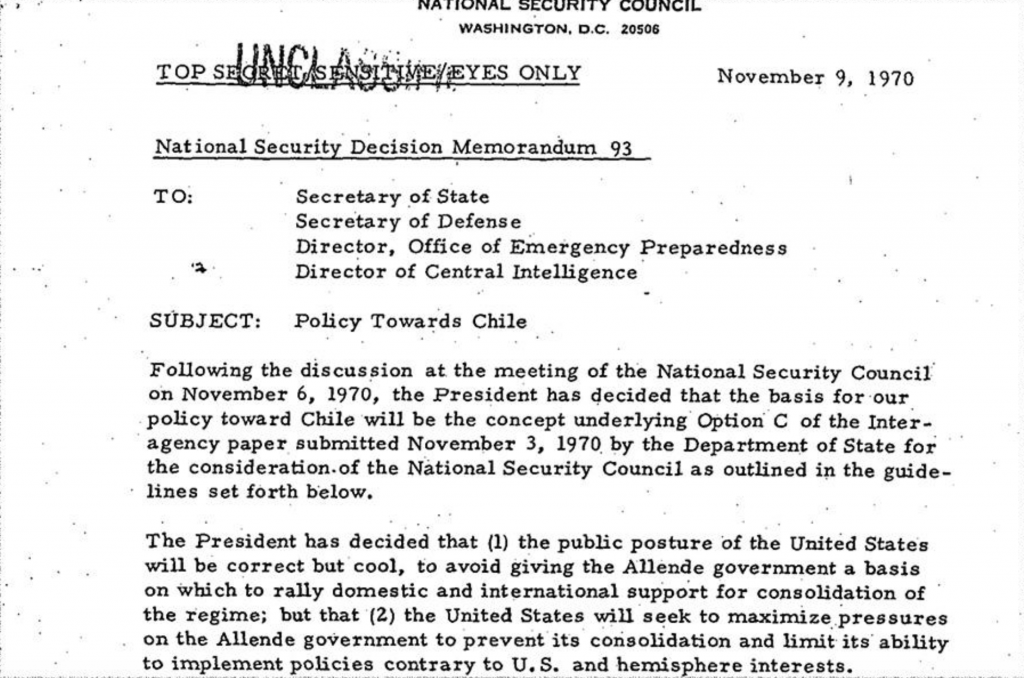
Allende’s policy of nationalizing the telecommunications industry proved problematic for US corporations that previously had control over this public utility. In a 1973 expose, the New York Times revealed that the ITT (International Telephone and Telegraph Inc), an international US-based telecommunications corporation that had previously owned 70% of the telecommunications industry in Chile, had put together an 18-point plan submitted to the Nixon administration to create an “‘economic squeeze on Chile’…so that sufficient ‘economic chaos would develop to convince the armed forces to ‘step in and restore order’”(The New York Times, 1972). Multinational corporations can act as an extension of the U.S. empire and hegemony; the culture of privatization is exported and violently reaffirmed. Though the Nixon administration did not follow through on all 18 proposed items, it deprived Chile of international credit by using its influence over American and world banks because they refused to compensate foreign investors for the money they lost over the resources that were nationalized (The New York Times, 1972). Corporations can be a part of the state apparatus of empire and share similar interests in economic expansion with the government.

Further, other countries can share a strategic interest with an empire and serve it. Continuing with the example of the American empire, in the radio segment “What is Palestine to the U.S.?”, former Black Panther Party member and political prisoner Mumia Abu Jamal speaks on this question from an imperial prison. He discusses how the U.S.’s support of Israel’s military occupation of Palestine is not rooted in an inherent hatred of Palestine, but rather a geopolitical decision to protect its own economic interests in the Middle East through financing a “colonial outpost” for the defense of its resources (oil). He remarks, “For empire is ever an exercise of global violence, for domination is but utter violation: the very root of violence.”[25] Here, Abu-Jamal connects the global violence of empire with geopolitical control. Abu-Jamal’s position as a political prisoner is also unique as political imprisonment has been used to silence dissent and opposition to criticism, precisely what Abu-Jamal expresses here. In the modern day, while foreign occupation and military-led expansionist projects still exist, indirect neocolonial methods of domination like influence through money, military aid, or ideology are more common and widely acceptable.
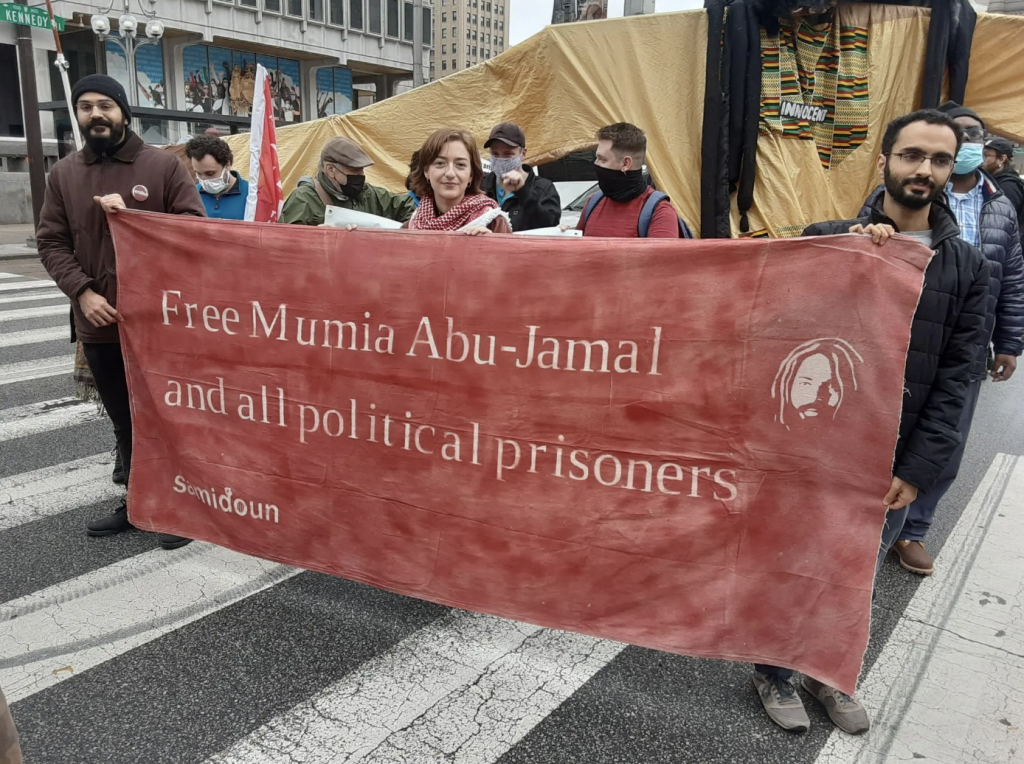
Challenging Empire: Resisting Hegemony through Community
Regarding the multitude of ways that an empire can expand, resistance has been a central theme in studies of empire throughout history. It is important to note that the resistance to empires originates from communities that are most exploited and taken advantage of. In other words, those that identify with the experiences of the bottom of an empire’s social hierarchy have shown the greatest degree of resistance. This is applicable in the context of the U.S. empire. As the concept of the United States is founded upon settler colonialist ideologies, resistance has occurred most from Black and Indigenous communities since the early interactions various European powers had with the hemispheric Americas.[17] The development and growth of the United States as a global power and nation-state throughout the course of history, especially in the 20th century, has promoted communities of color to resist against empire and build solidarity with each other in the struggle against white supremacy and western colonization. These communities of color approach the U.S. empire as a political entity that erases their culture, traditions, and histories.[21] In activism and organizing spaces, the concept of empire is a lived reality that many marginalized communities are suffering under. In order to liberate themselves from the empire, their liberation must be fought for through initiatives that foster community and healing. These initiatives often take place through community organizing and local activism that mobilizes community members of all ages to fight for a better world.
The Third World Liberation Front (TWLF) strikes were a prominent illustration of community-led liberation and the power of coalition-building from various communities of color in the San Francisco Bay Area. This grassroots momentum and activism are inspired by the struggle for liberation under the U.S. empire that is oppressive against communities of color. According to a 2019 NPR article, The Third World Liberation Front was a direct and successful attempt at politicizing various student communities to fight against the cultural imperialism of U.S. policies at the time, both domestically and across waters, specifically with U.S. involvement in Southeast Asia. Their demands, inspired by the organizing of the Black Panther Party and racial discourse across their college campuses, inspired TWLF organizers to demand ethnic studies colleges, increased hiring of faculty of color, and as well as ending college ties to U.S. military and foreign intervention.[20] TWLF demonstrates what is possible when students, specifically students of color, organize together and understand each other’s struggles. TWFL organizers knew what was at stake and encouraged solidarity and coalition building to create a force that is a culmination of grassroots activism to fight for a better future.
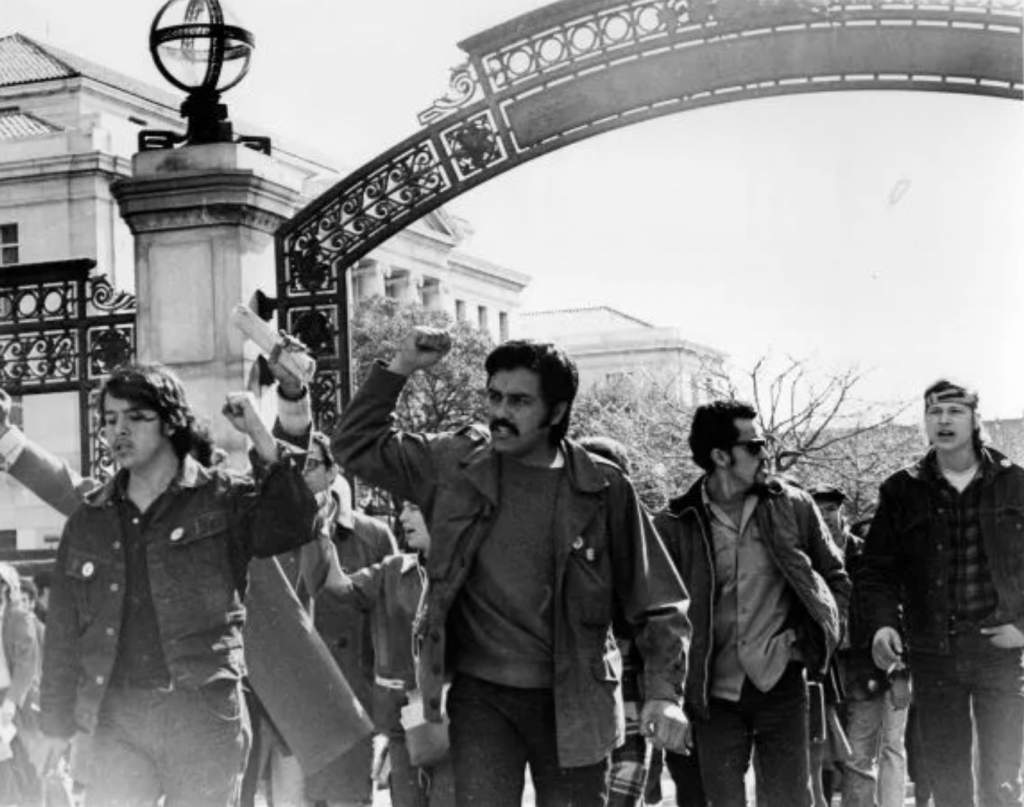
The legacies of TWLF are long-lasting and diffused across the United States. For instance, in Massachusetts, there are a multitude of grassroots organizations that either directly address militarism and its connections to U.S. empire such as the Massachusetts Peace Action. Organizations also work directly with communities that have been most impacted by the U.S. empire and help them get the social services they need to survive such as the Massachusetts Immigrant and Refugee Advocacy Coalition. Even within Tufts University, the creation of the Department of Studies in RCD (Race, Colonialism, and Diaspora) in 2018 is a testament to the powerful legacy of the TWLF strikes of 1968 and 1969 as well as the various student activist groups that are organizing around issues and demands similar to the TWLF.
Grace Lee Boggs, a pioneering activist in the fight for justice in the U.S. empire, powerfully states in her book, The Next American Revolution: Sustainable Activism, that we are the leaders that we have been waiting for.[18] This quote is applicable to the grassroots community organizing that occurs throughout the United States, which expands beyond the physical land boundaries of the country, and stresses the importance of local networks in social change and liberation. Resistance to empire has been present and a force to challenge the status quo imposed by the U.S. empire both domestically and abroad, especially in Asian countries.
Communities organizing around anti-U.S. empire presence and practices connect the definition of empire to cultural imperialism and the social relations that arise from a physical expansion of land. In American society, there have been attempts at achieving internationalism and promoting dialogue on the interconnected struggles faced by marginalized communities both domestically within the United States and abroad.
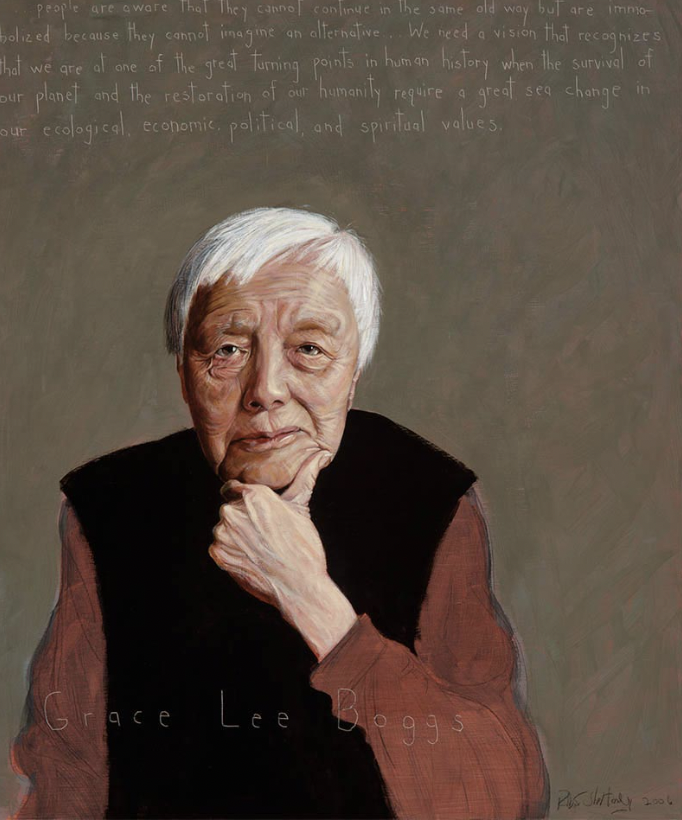
Illustration of Grace Lee Boggs 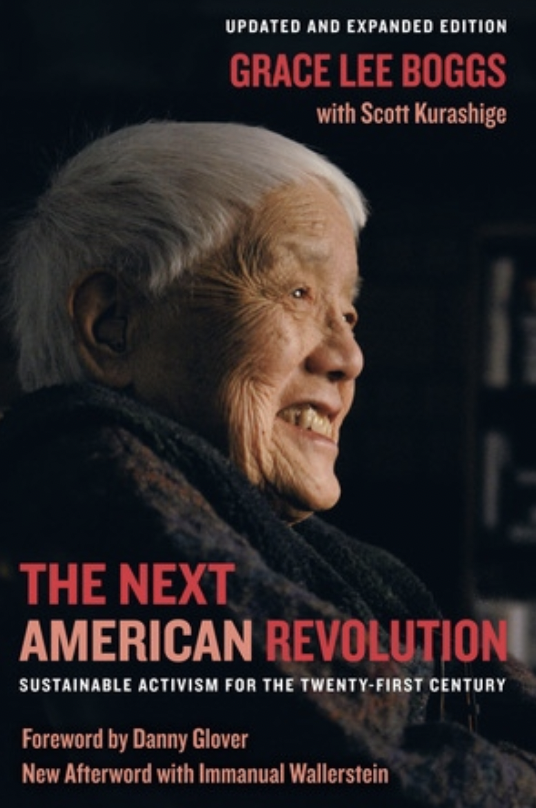
The Next American Revolution: Sustainable Activism in the Twenty-First Century by Grace Lee Boggs
A prominent example that illustrates this international solidarity is the recent resurgence of anti-Asian violence in the continental United States and how this violence is connected to U.S. empire during the 1900s.[19] U.S. foreign policies and domestic events happening are interconnected. With the example of anti-Asian violence, U.S. foreign policies and practices that are executed abroad are then brought home because they have been legitimized by the United States government to further their imperialist project. This definition of empire connects cultural imperialism to society within the U.S. empire, and how communities of color are suffering under these historical practices that are continued today abroad in other regions of the world. The activism around anti-empire practices are also a testament to the resistance of cultural imperialism and the centering of marginalized voices that are advocating for the desperate need for a new world where they are freed from traumatic institutions that continually oppress their communities.
Empire Expansion: Historical vs. Modern Day
Beyond our analysis of the term empire through the lens of American history, influence, and communities, we looked at the ways in which empires have territorially expanded throughout both history and modern-day empires. The examples we will discuss are Russia (a historical and current empire), and the historical Roman and Persian Empires. These three Empires began their reigns with power-driven rulers striving to expand their territory through violence, battle, and war, while maintaining control over many years through more violent tactics paired with imperialism.
Starting with historical Russia, the original Russian Empire’s rulers descended from Moscow and, over the course of four centuries, they gained control over present-day Russia, Belarus, and Ukraine.[12] Following the reign of the Ottoman Empire, the Russian Empire expanded, and had far more land than citizens compared to other empires, such as France which had less land, but more citizens. The interesting part about Russia’s Empire was that “No other great sedentary empire in history had a heartland in so northern a latitude, so far from the centers of international trade and culture.”[12] While this made economic expansion very difficult due to the high costs associated with trade, having Moscow be the center of Russia’s Empire had a very specific perk: there was a main river called the Volga, that led to the Baltic sea and the Caspian sea. This allowed them to proceed with trade, along with transportation in and out of the capital fast. Having Moscow in such a distant location, kept the empire safe from any attacks, and if anyone did attack them, they could easily see it coming, due to Russia’s tough, muddy terrain, lack of food to feed armies, and lack of hidden transportation into the capital, Moscow. Over the next hundred years, Russia prioritized its own security and internal expansion, while they let other empires fight each other, starve, and destruct internally as the Ottoman Empire did.
Today, Russia still maintains control over its capital, Moscow, along with the Russian citizens, enormous amounts of land, resources, military members, and nuclear firepower. As we have seen, Russian President, Vladimir Putin has led violent invasions on Russia’s neighbor, Ukraine. Putin appears to be trying to reclaim Russia’s status as an “Imperial power and assert Russia’s prestige, authority and will on the world stage.”[14] Putin is portraying a frustrated leader who is operating with full control of a powerful State with decreasing power and decreasing economic value. Russia is an example of a present-day empire that has a dangerous leader at the helm, who is attempting to expand its territory using violence to reassert itself as a powerful State, even if that means killing innocent people… On top of all of this, there are numerous internal conflicts within Russian society that are leaving Russian citizens very unhappy with Putin’s violent tactics, and it has been said that “Russian society is perturbed… and its reluctant compliance may soon turn into anger… In this light, every tactical success of the Ukrainians’ flexible offensive might produce heavy political resonance and expose Putin’s miscalculations.”[16]
The next empire to examine is the famous Roman Empire which started as “a period of unrest and civil wars in the 1st century BCE marked the transition of Rome from a republic to an empire. This period encompassed the career of Julius Caesar, who eventually took full power over Rome as its dictator.”[13] A violent start for the Roman Empire led to control over their State and the start of the Roman Empire. Through assassinations, war, and hundred’s of years of ruling, the Roman Empire is still known as one of the longest-reigning, most powerful empires of all time because of its fearless, but violent leaders, and their quests for advancement no matter what foreign citizens it ended up significantly, negatively impacting.
Lastly, let’s examine the Persian Empire, which, “At its height… encompassed the areas of modern-day Iran, Egypt, Turkey, and parts of Afghanistan and Pakistan.”[15] The Persian Empire is said to be “The Largest Empire ever.”[11] The Persian Empire was the largest empire in the history of humankind. In 480 B.C, the Persian Empire ruled over 44% of the WORLD’s population. “The Persian Empire began to decline… with an unsuccessful campaign to invade Greece and continued {to decline} with irresponsible spending upon returning home. Persia was eventually conquered by Alexander the Great in 334 B.C.E.”[15] Persia was one of the most powerful empires in history that gained its power mainly from territorial expansion through invasions, war, and imperialism.
As seen from the examples above, most famous historical empires have begun with power-driven rulers striving to expand their territory through violence and battle/war. The main difference between historical empires and modern-day empire, like Russia, is that the citizens of the empire were more in favor of expanding the empire through violence in historical times. In those times, citizens would support the leader of the empire’s decision because it usually led to their continued, long-term safety. Also, there was a feeling of pride that came with, one, being included in a historically great empire, and two, the feeling that citizens got when their empire won a battle and they could continue to live in peace without having to worry about a new ruler conquering and imperializing them. However, in today’s world, Russia’s tactics are not respected around the world, or by the majority of the citizens of Russia. Citizens do not take pride in their country’s violent, unjust invasions of innocent territories. It is no longer acceptable to expand and increase the power of an empire through the use of violence, because killing innocent civilisinas should never be tolerated.
Conclusion
The definition and analysis of the term empire has shifted throughout time and will continue to change as political decisions, historical events, and social movements shape international relations. The strategies in which countries have used to expand their own empire and influence other empires across historical time periods have long-lasting legacies that affect societies in the 21st century. Some of these tactics included violent invasions, wars, and imperialization. In America’s case, the U.S. established military bases abroad which became another form of hidden, but distinct, territorial expansion of the U.S. empire. These occupations actively affect the surrounding community’s social political culture and way of life. We can see that people both abroad, and at home within the U.S., have worked actively to resist oppressive forms of empire expansion. This resistance directly challenges the insularity that the US empire perpetuates in order to separate the struggles faced abroad and domestically. The solidarity fostered across international waters is powerful, and creates grassroots networks that unite as well as mobilize the underclass in a lifelong fight for liberation. It is important that we, living in American society, continue to analyze terms like empire with a critical lens as its meanings evolve depending on what factors and perspectives are included and, more importantly, excluded.
References
- Colomer, Josep M. 2017. “Empires Versus States.” In Oxford Research Encyclopedia of Politics. https://doi.org/10.1093/acrefore/9780190228637.013.608.
- Puri, Samir. 2021. “How the U.S. Reinvented the Notion of Empire.” Big Think (blog). August 18, 2021. https://bigthink.com/the-present/us-america-reinvented-empire/.
- Immerwahr, Daniel. 2016. “The Greater United States: Territory and Empire in U.S. History *.” Diplomatic History 40 (3): 373–91. https://doi.org/10.1093/dh/dhw009.
- Vine, David. 2019. “No Bases? Assessing the Impact of Social Movements Challenging US Foreign Military Bases.” Current Anthropology 60 (S19): S158–72. https://doi.org/10.1086/701042.
- Shibusawa, Naoko. 2021. “U.S. Empire and Racial Capitalist Modernity*.” Diplomatic History 45 (5): 855–84. https://doi.org/10.1093/dh/dhab058.
- Okinawa Prefectural Government Washington D.C. Office. n.d. “U.S. Military Base Issues in Okinawa.” Accessed December 4, 2022. https://dc-office.org/basedata.
- Vine, David. 2015. Base Nation: How U.S. Military Bases Abroad Harm America and the World. Henry Holt and Company.
- Agard, John. 2005. “Flag.” Genius. 2005. https://genius.com/John-agard-flag-annotated.
- Wuerker, Matt. n.d. We Come As Liberators. Accessed November 12, 2022. https://collapseofindustrialcivilization.files.wordpress.com/2013/02/empire.jpg.
- France-Presse, Agence. 2016. “Thousands Surround Japan Parliament In Protest at US Base Plan.” Defense News. February 21, 2016. https://www.defensenews.com/home/2016/02/21/thousands-surround-japan-parliament-in-protest-at-us-base-plan/.
- LiveScience Videos. “What Was the Largest Empire in the World?” YouTube, YouTube, 19 Nov. 2020, https://www.youtube.com/watch?v=MItttsNNCuI.
- Lieven, Dominic. “How Russia Became an Empire.” Literary Hub, 15 June 2022, https://lithub.com/how-russia-became-an-empire/ .
- Brittannica. “Roman Empire.” Encyclopædia Britannica, Encyclopædia Britannica, Inc., 2022, https://www.britannica.com/place/Roman-Empire.
- Hartnett, Lynne. “Perspective | the Long History of Russian Imperialism Shaping Putin’s War.” The Washington Post, WP Company, 2 Mar. 2022, https://www.washingtonpost.com/outlook/2022/03/02/long-history-russian-imperialism-shaping-putins-war/.
- National Geographic Society. “Persian Empire.” National Geographic Society, https://education.nationalgeographic.org/resource/persian-empire.
- OilPrice.com {Yahoo editor}. “Putin Sees Pushback from Russians Following Nuclear Saber-Rattling.” Yahoo! Finance, Yahoo!, 2022, https://finance.yahoo.com/news/putin-sees-pushback-russians-following-190000126.htm.
- Hubbell, B. (2022, September 12). “People who have interrupted empire”: African and Indigenous Resistance in the Sixteenth and Early Seventeenth Centuries. Liberating Narratives. Retrieved November 27, 2022, from https://www.liberatingnarratives.com/people-who-have-interrupted/
- Boggs, G. & Kurashige, S. (2012). 6. We Are the Leaders We’ve Been Looking For. In The Next American Revolution: Sustainable Activism for the Twenty-First Century (pp. 159-178). Berkeley: University of California Press. https://doi.org/10.1525/9780520953390-010
- Ahn, C., Park, T. K., & Richards, K. (2021, April 1). Anti-Asian Violence in America is Rooted in US Empire. The Nation. Retrieved from https://www.thenation.com/article/world/anti-asian-violence-empire/
- Hiebs, Maya. “Third World Liberation Front (TWLF).” A Creative’s Guide to Asian American Media Studies, December 7, 2018. https://blogs.cornell.edu/asianammedia/2018/12/07/third-world-liberation-front-twlf/.
- The Third World Liberation Front. The Berkeley Revolution. (n.d.). Retrieved from The Third World Liberation Front.
- Kissinger. H & Nixon. R (1973, September 16). TELECON: September 16, 1973, 11:50 A.M. [Personal communication transcript]. The National Security Archive. https://nsarchive2.gwu.edu/NSAEBB/NSAEBB255/19730916KP5.pdf
- CBS News. CIA Reveals Covert Acts in Chile | September 20, 2000 16:07:32. (2004, August 7).
- The New York Times. Papers show I.T.T Urged U.S. To Help Oust Allende. (1972, July 3). https://www.nytimes.com/1972/07/03/archives/papers-show-itt-urged-us-to-help-oust-allende-suggestions-for.html?ref=oembed
Abu-Jamal, Mumia. “What Is Palestine to the U.S.” Prison Radio, October 28, 2014. https://www.prisonradio.org/commentary/what-is-palestine-to-the-u-s/.
Contributors
Maya Chandrakasan (A’25), James Dillon (A’23), Josephine Kuo (A’23), Ziyi Billy Zeng (A’25)

